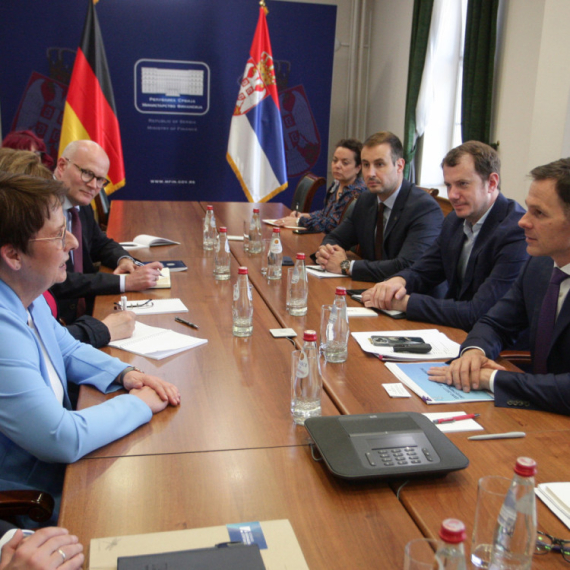Macedonian parliament dissolved
The Macedonian parliament has been dissolved after 70 of the 120 MPs voted in favor of new elections.
Saturday, 12.04.2008.
14:16

The Macedonian parliament has been dissolved after 70 of the 120 MPs voted in favor of new elections. The biggest opposition party, the Social Democratic Union, did not participate in the vote after leaving the chamber. Macedonian parliament dissolved The decision is legitimate because, under the law on dissolution, 61 votes out of 120 are required. The vote came after a marathon two-day debate on a proposal from the opposition Albanian Democratic Union for Integration (DUI) for snap elections. The proposal was supported by the ruling VMRO DPMNE and its coalition partner, the Democratic Party of Albanians (DPA), while the Social Democratic Union, several smaller parties and independent MPs opposed the motion. Speaker Ljubisha Georgievski wished all the parties luck at the forthcoming vote, though he did not set a date. According to announcements from Prime Minister Nikola Gruevski, elections should be held within 60 days, which means by mid-June. Prior to dissolution, the parliament took a decision on the dispatch of new troops to join the EUFOR contingent in Bosnia-Hercegovina, as well as to the coalition in Afghanistan and Iraq. A few hours before dissolution, Macedonian President Branko Crvenkovski and leaders of the biggest political parties agreed to support the resumption of negotiations with Greece over the “name” crisis, mediated by UN envoy Matthew Nimitz. A1 TV reported that Nimitz was coming to Macedonia on Thursday, before heading for Athens. At the meeting, it was agreed that the parliament would continue to function in a technical capacity, that all the parties would be kept informed, and would give their support to the talks process. It was also agreed not to abuse the “name” crisis during the electoral campaign. Elections were called after Macedonia’s failure to receive an invitation to join NATO at the Alliance’s conference in Bucharest, when Greece used its veto because of the continuing “name” dispute. The proposal for early elections came from Alija Ahmeti’s opposition Democratic Union for Integration, but was accepted by VMRO DPMNE leader Gruevski, who said that, as prime minister, his “hands were tied” over the stalemate in parliament, for which he laid the blame squarely at the door of the Social Democratic Union (SDSM). SDSM leader Radmila Shekerinska felt that Gruevski was shirking his responsibilities following the failures at the Bucharest summit, and that the decision to dissolve represented “electoral falsification.” DPA leader Menduh Thaci accepted early elections, saying that he would “confront the DUI on the battlefield.” Macedonian press agency INA, quoting sources from Ramush Haradinaj’s party, reported that he had advised the two Albanian parties (the DPA and the DUI) to form a coalition at the next elections, as together they could gain 35 of the 120 seats in parliament. Heated debate in the Macedonian parlaiment (FoNet)
Macedonian parliament dissolved
The decision is legitimate because, under the law on dissolution, 61 votes out of 120 are required. The vote came after a marathon two-day debate on a proposal from the opposition Albanian Democratic Union for Integration (DUI) for snap elections.The proposal was supported by the ruling VMRO DPMNE and its coalition partner, the Democratic Party of Albanians (DPA), while the Social Democratic Union, several smaller parties and independent MPs opposed the motion.
Speaker Ljubisha Georgievski wished all the parties luck at the forthcoming vote, though he did not set a date.
According to announcements from Prime Minister Nikola Gruevski, elections should be held within 60 days, which means by mid-June.
Prior to dissolution, the parliament took a decision on the dispatch of new troops to join the EUFOR contingent in Bosnia-Hercegovina, as well as to the coalition in Afghanistan and Iraq.
A few hours before dissolution, Macedonian President Branko Crvenkovski and leaders of the biggest political parties agreed to support the resumption of negotiations with Greece over the “name” crisis, mediated by UN envoy Matthew Nimitz.
A1 TV reported that Nimitz was coming to Macedonia on Thursday, before heading for Athens.
At the meeting, it was agreed that the parliament would continue to function in a technical capacity, that all the parties would be kept informed, and would give their support to the talks process.
It was also agreed not to abuse the “name” crisis during the electoral campaign.
Elections were called after Macedonia’s failure to receive an invitation to join NATO at the Alliance’s conference in Bucharest, when Greece used its veto because of the continuing “name” dispute.
The proposal for early elections came from Alija Ahmeti’s opposition Democratic Union for Integration, but was accepted by VMRO DPMNE leader Gruevski, who said that, as prime minister, his “hands were tied” over the stalemate in parliament, for which he laid the blame squarely at the door of the Social Democratic Union (SDSM).
SDSM leader Radmila Shekerinska felt that Gruevski was shirking his responsibilities following the failures at the Bucharest summit, and that the decision to dissolve represented “electoral falsification.”
DPA leader Menduh Thaci accepted early elections, saying that he would “confront the DUI on the battlefield.”
Macedonian press agency INA, quoting sources from Ramush Haradinaj’s party, reported that he had advised the two Albanian parties (the DPA and the DUI) to form a coalition at the next elections, as together they could gain 35 of the 120 seats in parliament.
















Komentari 0